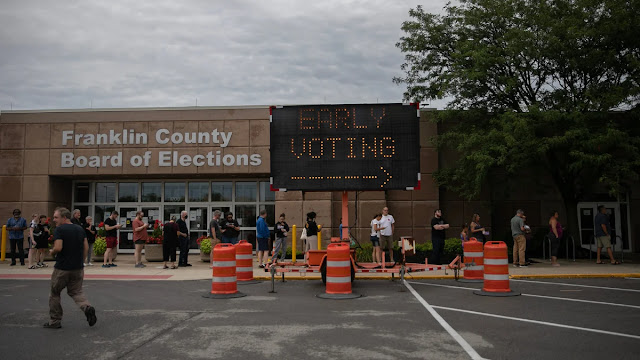Ohio voters head to the polls next week to decide the future of abortion access in their state. A controversial ballot measure, known as Issue 1, proposes an amendment to the Ohio constitution that would establish the right to abortion before fetal viability. With abortion bans sweeping Republican-led states since the overturning of Roe v. Wade, the high-stakes Ohio vote could set the tone for similar initiatives across America.
The hotly debated Issue 1 would allow abortions up to 23–24 weeks and lift current restrictions, including Ohio’s pending 6-week ban. But ballot language approved by the Republican-led state elections board has ignited uproar. It refers to a “fetus” as an “unborn child”, wording opponents claim is biased.
Recent polls forecast Issue 1 passing with 52–59% support, despite strong opposition from pro-life groups. Nationally, one-third of Republicans back preserving some abortion access. This reveals a disconnect between GOP lawmakers rapidly restricting abortions and voters who do not support outright bans.
“The pro-life side had it easy when abortion was legal,” said Republican pollster Steven Mitchell. But voter anger erupted when Roe fell. With young voters galvanized, Mitchell warned this threatens the GOP’s future prospects.
Abortion Access At Stake
Currently, abortion remains legal in Ohio up to 22 weeks. But legislators passed a ban at 6 weeks, before most women realize they are pregnant. This law is temporarily blocked but under appeal.
Issue 1’s backers stress a 6-week ban is extreme. Supporters want to lock in rights before the conservative Ohio Supreme Court rules. If Issue 1 fails, the state would join over a dozen others outlawing abortion in all cases.
“It’s insane to ban abortion without exceptions for rape or the mother’s health,” says a father featured in a recent ad. Ohio Right To Life counters that Issue 1 is unnecessary since abortion access still exists. But supporters push back that such access is precarious without constitutional protection.
With Roe overturned, Issue 1’s fate carries national significance. Its defeat may signal abortion opponents have an effective counterstrategy to ballot measures. Its passage could spur similar initiatives in Arizona, Florida and elsewhere. Activists are already working to get abortion rights on 2024 ballots.
Republican Pushback
Alarmed, the GOP aims to bar such measures. Florida’s attorney general asserts proposed ballot language is invalid. Missouri officials erected obstacles to an abortion rights amendment, claiming taxpayer costs. This pushback reflects fear that abortion ballot wins boost Democratic turnout.
After an abortion rights measure prevailed in Michigan last year, turnout surged among young voters, helping Democrats flip the state legislature. A similar uptick in Ohio could impact its tight senate race.
Some posit focusing on later abortions taps voter ambivalence. An October poll showed Virginians split on a proposed 15-week ban. While over 60% want 1st trimester access intact, support drops dramatically after that. A 15-week ban balances abortion rights with limits perhaps more palatable to conflicted voters.
Virginia’s high-stakes election will test this strategy. National Republicans watch closely, hoping abortion may yet be neutralized as a galvanizing issue for Democrats. But for now, the GOP aims to downplay its stance to woo swing voters.
Ripe For Litigation
Legal experts foresee “a litigation bonanza” around disputed ballot language if Issue 1 passes. Ohio’s Republican officials may argue the validity of ballot wording supersedes the actual constitutional text. Backers will likely sue demanding the amendment’s original language be upheld.
Abortion foes also want the conservative state Supreme Court to limit the impact of any pro-abortion passage. But proponents will assert that voters’ intent was clear regardless of disputed wording.
Ohio reproductive law experts predict years of litigation if Issue 1 prevails. “This is an area ripe for lawsuits on both sides,” says Case Western Reserve University law professor Jessie Hill.
Ruling Expected Next Year
With Ohio’s top court leaning anti-abortion, a ruling is not expected until sometime in 2024. That means abortion access in Ohio may remain in limbo for months or longer after Tuesday’s vote.
Though forecast to pass, Issue 1’s ultimate impact depends on whether courts heed the will of voters or side with Republican officials aiming to undermine the amendment.
If Issue 1 fails, GOP lawmakers will likely move swiftly to enact Ohio’s 6-week ban. That would make Ohio the 14th state with severe abortion restrictions, leaving many without options.
Whatever the outcome, all eyes are on Ohio as a bellwether of America’s abortion landscape. The symbolically potent vote will ripple across other states grappling with this polarizing issue. With abortion ensnared in legal ambiguities, this high-stakes election turns on public sentiment to chart Ohio’s course.





















